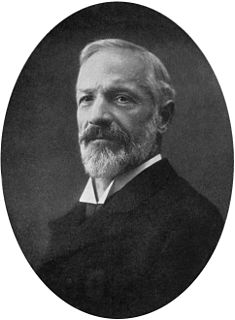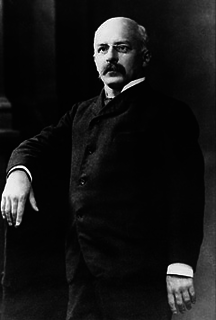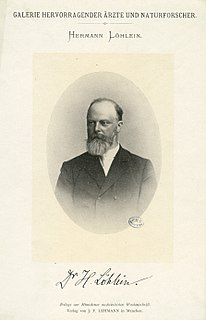
Richard Julius Ernst Frommel (16 July 1854 – 6 April 1912) was a German obstetrician and gynecologist who was a native of Augsburg.

Germany, officially the Federal Republic of Germany, is a country in Central and Western Europe, lying between the Baltic and North Seas to the north, and the Alps to the south. It borders Denmark to the north, Poland and the Czech Republic to the east, Austria and Switzerland to the south, France to the southwest, and Luxembourg, Belgium and the Netherlands to the west.

Augsburg is a city in Swabia, Bavaria, Germany. It is a university town and regional seat of the Regierungsbezirk Schwaben. Augsburg is an urban district and home to the institutions of the Landkreis Augsburg. It is the third-largest city in Bavaria with a population of 300,000 inhabitants, with 885,000 in its metropolitan area.
In 1877 he received his medical doctorate at the University of Würzburg, and for the next ten years worked in Vienna, Berlin and Munich. At Berlin he was an assistant to gynecologist Karl Ludwig Ernst Schroeder (1838–1887). From 1887 until 1901 he was director of the department of obstetrics and gynaecology at the University of Erlangen. Despite a successful career in gynecology, Frommel abruptly retired from medicine in 1901 at the age of 46.

The Julius Maximilian University of Würzburg is a public research university in Würzburg, Germany. The University of Würzburg is one of the oldest institutions of higher learning in Germany, having been founded in 1402. The university initially had a brief run and was closed in 1415. It was reopened in 1582 on the initiative of Julius Echter von Mespelbrunn. Today, the university is named for Julius Echter von Mespelbrunn and Maximilian Joseph.

Vienna is the federal capital and largest city of Austria, and one of the nine states of Austria. Vienna is Austria's primate city, with a population of about 1.9 million, and its cultural, economic, and political centre. It is the 7th-largest city by population within city limits in the European Union. Until the beginning of the 20th century, it was the largest German-speaking city in the world, and before the splitting of the Austro-Hungarian Empire in World War I, the city had 2 million inhabitants. Today, it has the second largest number of German speakers after Berlin. Vienna is host to many major international organizations, including the United Nations and OPEC. The city is located in the eastern part of Austria and is close to the borders of the Czech Republic, Slovakia, and Hungary. These regions work together in a European Centrope border region. Along with nearby Bratislava, Vienna forms a metropolitan region with 3 million inhabitants. In 2001, the city centre was designated a UNESCO World Heritage Site. In July 2017 it was moved to the list of World Heritage in Danger.

Berlin is the capital and largest city of Germany by both area and population. Its 3,723,914 (2018) inhabitants make it the second most populous city proper of the European Union after London. The city is one of Germany's 16 federal states. It is surrounded by the state of Brandenburg, and contiguous with its capital, Potsdam. The two cities are at the center of the Berlin/Brandenburg Metropolitan Region, which is, with 6,004,857 (2015) inhabitants and an area of 30,370 square km, Germany's third-largest metropolitan region after the Rhine-Ruhr and Rhine-Main regions.
Frommel is known for his pioneer work in treatment of ruptured ectopic pregnancy. A surgical technique known as the "Frommel operation" is used as treatment for retroversion of the uterus. This surgery involves shortening the uterosacral ligaments via the abdominal route. [1] [2]

Ectopic pregnancy is a complication of pregnancy in which the embryo attaches outside the uterus. Signs and symptoms classically include abdominal pain and vaginal bleeding. Fewer than 50 percent of affected women have both of these symptoms. The pain may be described as sharp, dull, or crampy. Pain may also spread to the shoulder if bleeding into the abdomen has occurred. Severe bleeding may result in a fast heart rate, fainting, or shock. With very rare exceptions the fetus is unable to survive.

The uterus or womb is a major female hormone-responsive secondary sex organ of the reproductive system in humans and most other mammals. In the human, the lower end of the uterus, the cervix, opens into the vagina, while the upper end, the fundus, is connected to the fallopian tubes. It is within the uterus that the fetus develops during gestation. In the human embryo, the uterus develops from the paramesonephric ducts which fuse into the single organ known as a simplex uterus. The uterus has different forms in many other animals and in some it exists as two separate uteri known as a duplex uterus.
With Johann Baptist Chiari (1817–1854), the eponymous "Chiari-Frommel Syndrome" is named. This condition is a rare endocrine disorder that affects women who have recently given birth. It is also known as postpartum galactorrhea-amenorrhea syndrome.
Johann Baptist Chiari was an Austrian gynecologist and obstetrician born in Salzburg.
Galactorrhea or lactorrhea is the spontaneous flow of milk from the breast, unassociated with childbirth or nursing.
Amenorrhea is the absence of a menstrual period in a woman of reproductive age. Physiological states of amenorrhoea are seen, most commonly, during pregnancy and lactation (breastfeeding), the latter also forming the basis of a form of contraception known as the lactational amenorrhoea method. Outside the reproductive years, there is absence of menses during childhood and after menopause.














